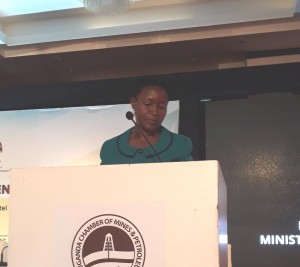Private sector input vital for skilling future oil workers
January 23—The government has been involved in quickening expansion and deepening the country’s skills pool to take advantage of future gains from the oil and gas industry, however this cannot be done without private sector involvement.

Seninde asked oil companies and others in the private sector to support the government in the skilling process.
“I appeal to oil companies that are available here, to be open up to Ugandans especially those who have finished their studies in oil and gas courses. Give them opportunities to train with these big international companies and gain skills that will be helpful to them when soliciting for oils jobs in future,” Rosemary Seninde, a state minister in the education ministry told a Skilling and Local Content Forum early this week.
The two-day event was organised by the Ministry and the Uganda Chamber of Mines and Petroleum (UCMP). According to the 2014 Industrial Baseline Survey (IBS), titled, ‘A survey to foster opportunities for Ugandans in the Oil and Gas sector’, Uganda’s petroleum sector will generate 100,000 to 150,000, direct and indirect jobs.
Seninde conceded that many job-seekers did not have the skills wanted by the oil companies and asked them to offer internship and apprenticeship opportunities to young Ugandans so that they can gain skills and experience to compete for these oil jobs.
The forum brought together private and government institutions as a way of laying a strong and reliable foundation for skilling Ugandans in a race against time. The government wants oil production to start by 2020 but is caught up in a classic skills gap or the mismatch between workers seeking jobs but not having the skills employers actually want.
Seninde suggested skills training institutions to register with the Ministry so that they can operate legally while benefiting from the advantages of government recognition when there are possibilities of financial support.
“We have a number of sector skills councils set up to support the private sector in skilling our people for oil and gas. By registering with us, these training companies will benefit from the support offered by these government institutions and also have access to information on how they can access funds put in place for skilling Ugandans,” she said.
UCMP President, Dr. Elly Karuhanga said,“Skilling takes time. We need everyone to come and get skilled to manage our oil industry. This assembly will gather all institutions – public and private – that are involved in skills development and training to lay the ground for clear programmes that will help Uganda achieve its Local Content aspirations.”
However there are concerns that 2014 IBS showed that only 25 industries of the 420 surveyed in Uganda had high potential to supply the oil and gas sector.

 African Heads of state head to South Korea next week for Summit talks
African Heads of state head to South Korea next week for Summit talks
 Trading leads as main source of income for Ugandans
Trading leads as main source of income for Ugandans
 New leadership for bankers’ umbrella as total assets top $12 billion
New leadership for bankers’ umbrella as total assets top $12 billion
 Brussels Airlines to announce Nairobi service
Brussels Airlines to announce Nairobi service
 SITA promises enhanced travel experience after Materna acquisition
SITA promises enhanced travel experience after Materna acquisition
 Saudia’s 105 aircraft order stretches A320neo lead over rival Max
Saudia’s 105 aircraft order stretches A320neo lead over rival Max
